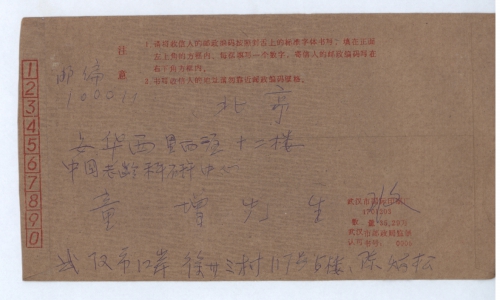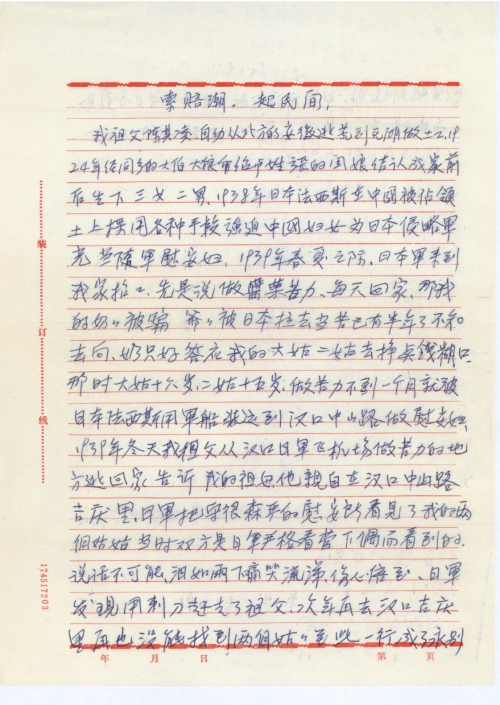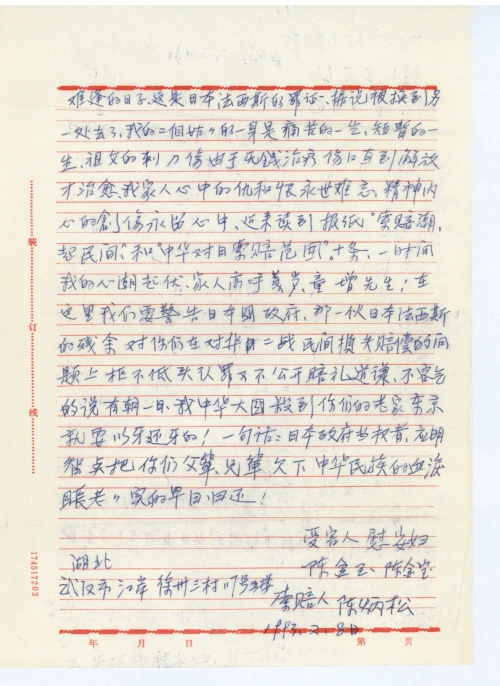Date of letter:1993-02-08
Address of author:Wuhan City, Hubei Province
Date of event:1938
Location of event:Not mentioned
Name of author:Chen Bingsong
Name(s) of victim(s):Chen Jinyu, Chen Jinbao (Chen Bingsong’s aunt), Chen Qiling (Chen Bingsong’s grandfather)
Type of atrocity:Sex Slaves (SS)
Other details:The Japanese soldiers came to my hometown persuading my grandfather to do hard work by promising him he could go home every day, but not until he was missing for half a year did my family knew they were cheated. My grandmother had to allow my two aunts to work for the Japanese to earn some money to feed the family. They did hard work for one month and then were transported by the Japanese soldiers to Hankou, working as comfort women. My grandfather escaped from the place where he did hard work and saw my two aunts. Unfortunately, the Japanese soldiers found him and drove him away with bayonets. Since then, he had not been seen or heard from. We will never forget the hatred at heart and the Japanese government must compensate us the victims.
Wave of Civil Claims
Since he was young, my grandfather Chen Qilin had fled from famine-stricken Anhui in northern China to Wuhu to work as a builder. In 1924, with the help of uncles and aunts from the same village, he met and married my grandmother Zhang Ji, who later gave birth to 3 girls and 2 boys. In 1938, Japanese fascists used various means to force Chinese women to be comfort women for the invading Japanese army. In spring and summer 1939, several Japanese soldiers came to our house, told us that they needed workers to make pickles and promised that the workers could go home every day. My grandmother believed them. At that time, my grandfather had been captured as a slave laborer for half a year and his whereabouts were unknown. So, my grandmother asked my oldest aunt and second oldest aunt to work in the pickle factory to make some money. Back then, my oldest aunt was 16 and my second oldest aunt 15. After working in the factory for less than a month, they were shipped by Japanese fascists to Zhongshan Road, Hankou to be comfort women. In the winter 1939, my grandfather escaped home from the Japanese Military Airport in Honkou where he worked as a slave laborer and told my grandmother that he saw with his own eyes my two aunts in the Comfort Station strictly guarded by the Japanese army in Jiqingli, Middle Road, Hankou. They saw each other by chance under strict supervision of the Japanese army, so it was impossible for them to talk. They cried sadly and were seen by a Japanese soldier. The soldier drove my grandfather away using a bayonet. The next year, my grandfather went back to Jiqingli, Hankou to find my two aunts, but in vain. They never saw each other again. This is proof of Japanese fascism’s crimes. It’s said that they had been transferred to another place. My two aunts lived a painful, short life. My grandfather’s wound caused by the bayonet wasn’t cured until the People’s Liberation due to lack of money for treatment. Hate and spiritual trauma remain in the heart of my family forever. So when I read from newspaper articles such as “Wave of Civil Claims” and “Ten Points about the Scope of Claim for Compensation from Japan”, I became quite emotional and my whole family shouted out of joy. Mr. Tong Zeng, we’d like to warn the Japanese government that if they refuse to apologize to and compensate the Chinese victims of the World War II, our great country will crush them down to their hometown Tokyo. In a word, the Japanese authorities shall wisely, honestly pay the debt of blood their previous generations owed to the Chinese people.
Victims and comfort women: Chen Jinyu, Chen Jinbao
3F, No. 117, 3rd Xuzhou Village, Jiang’an, Wuhan, Hubei
Claimant: Chen Bingsong
February 8, 1993
















